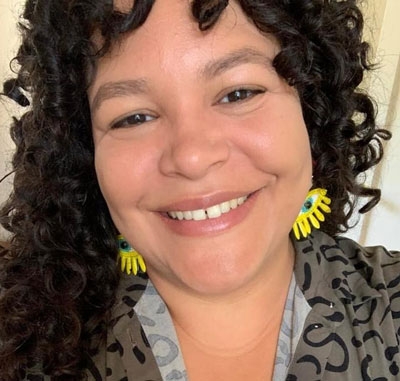
The Black Studies Program Raquel Albarrán Lecture Spring 2024 Speaker--Professor Juliet Hooker
Why Erica Garner Also Couldn’t Breathe: Maternal Grief and Black Politics
Axinn Center 232
Open to the Public
The Raquel Albarrán Lecture Series, in honor of our beloved friend and esteemed colleague, Raquel Albarrán.

Professor Albarrán joined Middlebury’s faculty and the Department of Luso-Hispanic Studies in 2018, and in her short time came to be loved and appreciated by students, staff, and faculty across campus. This was not only because she was a kind, insightful, and generous person who could positively change your life in one conversation; but also because of the transformative work she did on campus with so many of us. One such place was in Black Studies. In her very first year, she joined the group of faculty who were forming the program’s curriculum, major, and vision. Her voice in this work was quickly impactful, and continued to be over the ensuing years as a founding member of the program and its steering committee.
She was also a brilliant scholar whose work cut across Black Studies, Indigenous Studies, Decolonial Thought, Black Feminisms, and Queer Theory. Professor Albarrán was adamant about placing our program in dialogue with the work of leading scholars in the field, and with the newest scholarship and thought produced within it. She was equally adamant about cultivating Black Studies on campus as a field of knowledge and meaning-making that intervenes across and beyond the academy.
Professor Albarrán thus was vital to and for our program, in the literal sense of the word. She was truly life-giving in shaping the program’s curriculum, its presence on campus, and its future life. Through this lecture series, and our work in the program, she will continue to be.
My first conversation with Raquel was in January 2018. It was supposed to be a lunch interview during her campus visit. We went to Fire and Ice. From her research lecture the previous afternoon, and from her application, I knew the college was on the verge of gaining a brilliant scholar and teacher. What I gleaned from our conversation over lunch, moreover, was that I, and many other members of the Middlebury community, were on the verge of gaining a life-changing friend. In the years that followed after I walked with her to the car service taking her to Burlington airport on that winter day nearly 5 years ago, that happy premonition turned out to be true.
We shared interests, both professional and personal—music, language, decolonial thought. For her, the scholarly and the personal were one in the most wonderful and sustainable ways, showing me and others a new form of existing in this world. Raquel knew that so much of the world was “messy” with few clear-cut answers. Her engagement with this showed us how to make meaning of tribulations, even if we could not make sense of them. What made her a great friend, professor, scholar, writer, and advisor was her ability to walk people through the complexities of a challenging world. Even though she struggled, like many of us do, she found ways of thriving in the nuance, uncertainty, undecidability of it all. And she bestowed that talent upon many of us.
Though I was her “senior colleague,” I looked up to her, and I never got the chance to tell her. I admired her as a scholar/teacher, but also has a human being navigating pain and triumph, making triumph out of the pain that many of us pray to avoid. Her resilience only enhanced her brilliance, all the while finding space for humor, deep care for loved ones and community, and dedication to students. She was always there in times of need. Always showed up for those she cared about, and this latter group was large. She redefined care as a concept and as an everyday practice that traversed all aspects of her professional and personal life, one that intertwined love and justice, whether that was in addressing the ongoing structures of colonialism or a student’s personal challenges. No one was as attentive to how those two are entangled than Raquel.
Her practice of love and justice shined through in many realms of the college. This led her to take on active roles far beyond her departmental appointment, and far beyond the realms of compensated labor. These were driven by her profound commitment to justice and dismantling of colonialism in all its forms, particularly those that endure on college campuses like ours. It is an understatement to say that Raquel did a lot to make this a place where marginalized students and colleagues can thrive.
This was most evident in her integral role in the Black Studies Program. In her very first semester, she became an active presence in the group of faculty that shaped the program before its approval in May of 2019. She entered this group, and brought her characteristic intellectual verve and love for the field to bear on the direction it would take. Her voice in this space, and from very early on, looked to guide the program toward the cutting edge of the field. She had a vision for our program. She wanted a program that did not just bring together existing resources and courses. She had a bolder view for its future, to be at the forefront of the field in terms of both teaching and scholarship; while staying true to the interventive history of the field. In this sense, she always advocated for our program to follow the mission of Black Studies in challenging colonial and racial presuppositions while bringing resistant forms of knowing to daily cultural and institutional life.
She furthered this mission as part of the Black Studies steering committee since the Fall of 2019. Since that time, she continued to shape the program, its curriculum, and its cultural and intellectual presence on campus through searches for new faculty, events for students, and the creation of spaces on campus for deep inquiry into the struggles for freedom and the realities of unfreedom from colonial life. She was adamant about augmenting the presence of Black Studies on campus as not just a program, but more importantly as a critical lens through which the college community can better understand the world.
Needless to say, the Black Studies program would not be where it is today without Raquel’s intellectual direction, commitment to institutional change, passion for engaging students, and care for her colleagues. All of these were further manifestations of her daily practice of love and justice. In the coming months, the Black Studies program will announce the ways in which we will honor Raquel’s profound contributions to our community and to our lives. In this way, we will continue to further Raquel’s vision and commitment to making the Black Studies program a cultural presence and intellectual conduit of transformation; a sustaining force for us and our students.
We will do the same in our interpersonal lives, moving forward with all that she taught us and modeled for us in her always thoughtful interactions with friends and colleagues. Like our pain, our gratitude to her is immeasurable. The consummate teacher, she taught her friends to love in the sense of justice and care for others, to be bold with ourselves and our aspirations, and to appreciate the complexities of life in order to thrive in them. This was all without us knowing that we were being taught, her impact came spontaneously and organically, simply by being. We will always carry her spirit and voice with us, and listen to it in both the hard times and the happy ones, just like we have until now in our journeys with her.
To say she was a wonderful person is the truest statement, but it merely scratches the surface. She was a model human being. She taught us how to be better for each other, whether in our individual personal lives or in the classroom. She taught us how to name emotions and actions with which we were grappling. Perhaps it was her poetic side. Side is not the right word, though. Poetic is an accurate descriptor, but it was more than a “side”. It was a whole approach to life and to all the pain and beauty, agony and joy, tragedy and triumph that life encompasses.
The college has lost an integral community member. Many have lost a generous and brilliant colleague. Many of us have lost a dearest and irreplaceable friend – a true compass in our lives. Though Raquel’s will be a permanent void in our lives, she has given us a lifetime of knowledge, wisdom, and love that will continue to guide us.
I thank you forever, my twin, and will miss you forever.
As I sit down and write this from half a world away in Amman, Jordan, I know that I should say that I am completely heartbroken but, honestly, I still cannot even believe that my dear friend Raquel Albarrán is no longer with us. I can’t believe that we will never polish off a tub of artichoke dip from the co-op, or that we will never get together to cook our Puerto Rican recipes, or have a Friday of drag race, pizza, and beer (BrewPaul Fridays, as she coined those nights). Never again will I hear her say to me “¡vamos a chismear!”, where “chismear” meant anything and everything, from spilling the latest college tea to taking the deepest of dives into the coloniality of academia. Not only was Raquel a brilliant intellectual who challenged her interlocutors, students and colleagues alike, to expand their understanding of the world around them, but she was also my queer partner-in-crime, in her words, “my U-Haul”. She was always eager to create spaces where we could discuss and explore our queer identities without shame or judgment. I realize how terribly important that has been for me in the last few years and I cannot imagine how to proceed in these explorations without her guidance and companionship. We were supposed to get our ears pierced together but kept on putting it off because of winter hats, because of upcoming trips, because of reasons that right now seem so tremendously unimportant. I wish I could tell her how much her friendship and companionship meant to me, I wish I could go with her and get our ears pierced.
I wish we could play that card game that she got me last summer. Every time we would sit down for trivia or for Boggle or any of the other games that she loved to play, she would always say: “¡Compartir, no competir!” This phrase is actually hard to translate. Literally it means “sharing, not competing”. But it doesn’t mean just “sharing”, it’s sharing while spending time together and reveling in each other’s company. This empathetic move away from divisive competition towards collaborative community building is an ethos that I will forever associate with Raquel; it was her goal to manifest it in her teaching, in her research, in her friendships…in every facet of her life. I’m so incredibly fortunate to have had Raquel share this disposition with me, and thanks to her I am a better professor, a better friend, a better person. No puedo creer que ya no vayamos a compartir más. Pero cada vez que use ese verbo, me acordaré de ti. Cada vez que pruebe el dip de alcachofas, me acordaré de ti. Cada vez que me ponga una pantalla, me acordaré de ti.
Espero seguir compartiendo con los demás de las tantas cosas que nos compartiste. Thank you, Raquel, for having shared so much with us.
Te quiere mucho, tu amiguis,
Marcos Rohena Madrazo
“The Joys of Black Feminist Worldmaking”
Axinn 232, 4:30 p.m.
The Black Studies Program Raquel Albarrán Lecture Spring 2025 Speaker is Brittney Cooper, Professor of Women’s, Gender, and Sexuality Studies and Africana Studies at Rutgers-New Brunswick.

Professor Cooper is also the Principal Investigator and Founding Director of the Race and Gender Equity (RAGE) Lab at Rutgers, a research incubator that focuses on research related to the social and political thriving of Black women and girls. Her books include Beyond Respectability: The Intellectual Thought of Race Women (2017) and Eloquent Rage: A Black Feminist Discovers Her Superpower (2018). Professor Cooper co-founded the Crunk Feminist Collective, a Hip Hop Generation Feminist Collective of Women of Color Activists and Scholars.

Axinn Center 232
Open to the Public
Axinn Center 229
Closed to the Public
Axinn Center 232
Closed to the Public